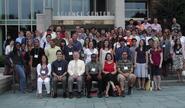
The Ninth Annual National MERCURY Conference on Computational Chemistry, devoted solely to undergraduates who are working on research projects in computational chemistry, was held at Hamilton from Aug. 1 through Aug. 3. The program offered an opportunity for undergraduates to learn about the breadth of research in computational chemistry, particularly in interdisciplinary topics and to discuss their work with other undergraduate computational chemists as well as some leaders in the field. Hamilton, the National Science Foundation and SGI provided support for the conference.
For faculty, it was an opportunity to generate a network of computational chemists who work with undergraduates, fostering collaboration and developing a sense of community in the field. Three posters were presented by students from Hamilton Assistant Professor of Chemistry Adam Van Wynsberghe’s research group. Erica Losito ’12 and Jeremy Adelman ’13 each presented posters detailing their summer research. Carlos Rico ’10 was a contributor to Losito’s work. In addition, Professor Van Wynsberghe’s summer research assistant Anna Hagstrom (Amherst ’13) presented a poster on which Sam Ha Eun Cho ’10 was a contributor. Keynote speakers included representatives from the University of Georgia, University of Pittsburgh, Georgia State University, Truman State University, University of California at Davis and GlaxoSmithKline.
Computational chemistry faculty from undergraduate institutions across the country formed the consortium known as the Molecular Education and Research Consortium in Undergraduate Computational chemistRY (MERCURY). The consortium initially allowed faculty and students from Colgate University, Connecticut College, Hamilton College, University of Richmond, College of the Holy Cross, St. Lawrence University and Vassar College access to state-of-the art computational power and numerous opportunities for student and faculty collaboration, mentoring and cross-fertilization. Bucknell University Dean of Faculty George Shields is the director of MERCURY.
The MERCURY Supercomputer Center at Hamilton provides access to high performance computing resources for chemistry students and researchers at multiple liberal arts institutions across the country. Available equipment includes an SGI Origin 300 system and two Linux Beowolf clusters running RedHat Enterprise Linux. Hamilton’s Steve Young is the Unix/HPC system administrator.
For faculty, it was an opportunity to generate a network of computational chemists who work with undergraduates, fostering collaboration and developing a sense of community in the field. Three posters were presented by students from Hamilton Assistant Professor of Chemistry Adam Van Wynsberghe’s research group. Erica Losito ’12 and Jeremy Adelman ’13 each presented posters detailing their summer research. Carlos Rico ’10 was a contributor to Losito’s work. In addition, Professor Van Wynsberghe’s summer research assistant Anna Hagstrom (Amherst ’13) presented a poster on which Sam Ha Eun Cho ’10 was a contributor. Keynote speakers included representatives from the University of Georgia, University of Pittsburgh, Georgia State University, Truman State University, University of California at Davis and GlaxoSmithKline.
Computational chemistry faculty from undergraduate institutions across the country formed the consortium known as the Molecular Education and Research Consortium in Undergraduate Computational chemistRY (MERCURY). The consortium initially allowed faculty and students from Colgate University, Connecticut College, Hamilton College, University of Richmond, College of the Holy Cross, St. Lawrence University and Vassar College access to state-of-the art computational power and numerous opportunities for student and faculty collaboration, mentoring and cross-fertilization. Bucknell University Dean of Faculty George Shields is the director of MERCURY.
The MERCURY Supercomputer Center at Hamilton provides access to high performance computing resources for chemistry students and researchers at multiple liberal arts institutions across the country. Available equipment includes an SGI Origin 300 system and two Linux Beowolf clusters running RedHat Enterprise Linux. Hamilton’s Steve Young is the Unix/HPC system administrator.
Posted August 6, 2010
